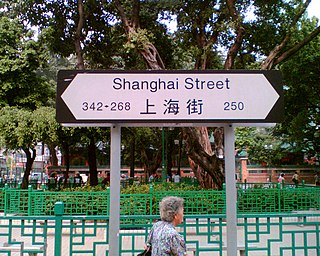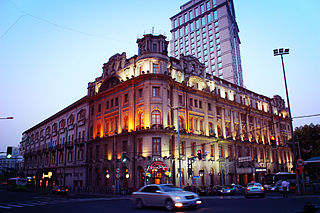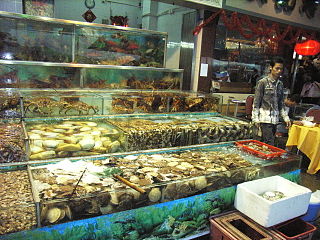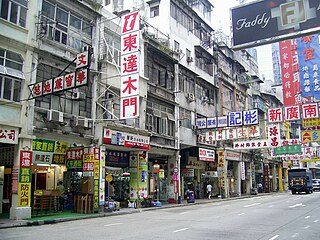
Dim sum is a large range of small dishes that Cantonese people traditionally enjoy in restaurants for breakfast and lunch. In the tenth century, when the city of Guangzhou (Canton) began to experience an increase in commercial travel, travelers concurrently began to frequent teahouses for small-portion meals with tea called yum cha, or "drink tea" meals. Yum cha includes two related concepts. The first is Yat jung Leung gin (一盅兩件), which translates literally as "one cup, two pieces". This refers to the custom of serving teahouse customers two pieces of delicately made food items, savory or sweet, to complement their tea. The second is dim sum (點心) and translates literally to "touching heart", the term used to designate the small food items that accompanied the tea drinking.

The Foreign Correspondents' Club (FCC) in Hong Kong is a members-only club and meeting place for the media, business and diplomatic community. It is located at 2 Lower Albert Road in Central, next to the Hong Kong Fringe Club, and they both occupy the Old Dairy Farm Depot at the top of Ice House Street, one of the few remaining colonial buildings in the Central district.
Zouk is a nightclub in Asia and United States. The club is named after a French creole word for 'party'. It has won the Singapore Tourism Board's "Best Nightspot Experience" award 6 times, between 1996 and 2007. Zouk was ranked as number 10 on DJ Magazine's list of Top 100 clubs in the world in 2006, 2007 and 2010. In 2017, Zouk Singapore earned its highest ranking yet at number 3, the top entry for clubs across Asia.

The Peninsula Hong Kong, is a colonial-style luxury hotel located in Tsim Sha Tsui, Kowloon, Hong Kong, is the flagship property of The Peninsula Hotels group, part of the Hong Kong and Shanghai Hotels Group. The hotel opened in 1928, and was the first under The Peninsula brand. Expanded in 1994, the hotel combines colonial and modern elements, and is notable for its large fleet of Rolls-Royces painted a distinctive "Peninsula green".

Café de Coral Holdings, Ltd. is a fast-food restaurant group that owns and operates fast-food chains and restaurants, including Café de Coral, Super Super, The Spaghetti House, Oliver's Super Sandwiches, Ah Yee Leng Tong, and others.

Hong Kong cuisine is mainly influenced by Cantonese cuisine, European cuisines and non-Cantonese Chinese cuisines, as well as Japanese, Korean and Southeast Asian cuisines, due to Hong Kong's past as a British colony and a long history of being an international port of commerce. From the roadside stalls to the most upscale restaurants, Hong Kong provides an unlimited variety of food and dining in every class. Complex combinations and international gourmet expertise have given Hong Kong the reputable labels of "Gourmet Paradise" and "World's Fair of Food".

BreadTalk Group Limited is a Singaporean multinational food and beverage corporation headquartered in Paya Lebar, Singapore.

Shanghai Tang is a Hong Kong luxury fashion house founded in 1994 by Hong Kong businessman David Tang. The brand is known for its luxury homeware collection, and its fine bone china is the finest type of porcelain with its superior whiteness, translucency and higher strength. In 1998, Richemont acquired David Tang's controlling stake in the business.

Shanghai Street is a 2.3 km long street in the Jordan, Yau Ma Tei and Mong Kok areas of Kowloon, Hong Kong, China. Completed in 1887 under the name of Station Street (差館街), it was once the most prosperous street in Kowloon. It originates from the south at Austin Road, and terminates in the north at Lai Chi Kok Road. Parallel to Shanghai Street are Nathan Road, Temple Street, Portland Street, Reclamation Street and Canton Road. Though parallel, Shanghai Street was marked by 2- to 3-floor Chinese-style buildings while Nathan Road was marked by Western-style buildings.

The Astor House Hotel (礼查饭店), known as the Pujiang Hotel (浦江饭店) in Chinese since 1959, has been described as once "one of the famous hotels of the world". Established in 1846 as Richards' Hotel and Restaurant (礼查饭店) on The Bund in Shanghai, it has been at 15 Huangpu Lu, Shanghai, near the confluence of the Huangpu River and the Suzhou Creek in the Hongkou District, near the northern end of the Waibaidu (Garden) Bridge, since 1858. The hotel closed on 1 January 2018, after being purchased by an undisclosed local business which will convert the building into office space for its own use.

Four Seasons Hotel Hong Kong is a five-star hotel building in the Sun Hung Kai Properties-owned International Finance Centre complex in Central, Hong Kong. It was completed and opened in September 2005. It is a 45-storey building with 399 rooms, of which 54 are suites, and also contains 519 residential units, as part of the Four Seasons Place. It is operated by Canadian-based hotel chain, Four Seasons Hotels and Resorts.

A Cantonese restaurant is a type of Chinese restaurant that originated in Southern China. This style of restaurant has rapidly become common in Hong Kong.

Bank of China Building is located at no.2A Des Voeux Road Central, Central, Hong Kong. It is a sub-branch of Bank of China.

Forum Restaurant is a Cantonese restaurant established in 1977 at Sino Plaza, Causeway Bay, Hong Kong. Run by Hong Kong's international chef and ambassador of Chinese cuisine, Yeung Koon Yat (楊貫一), it is one of the best known eateries in Hong Kong.

Sir David Wing-cheung Tang,, was a Hong Kong businessman, philanthropist and socialite. He was best known for founding the Shanghai Tang fashion chain in 1994, which he sold in 1998 to Richemont.

Yue Hwa Building is a historic building located at the junction of Eu Tong Sen Street and Upper Cross Street in Chinatown, Singapore, next to Chinatown MRT station. Built by Swan and Maclaren in 1927, it was then the tallest building in Chinatown and was known as Nam Tin Building (南天大厦), owned by Lum Chang Holdings. The building housed the six-storey Great Southern Hotel, along with a few shops and cabarets that were popular among Chinese travellers. In 1993, Lum Chang Holdings sold the building to Hong Kong businessman Yu Kwok Chun, who converted it to the first Yue Hwa Chinese Products department store in Singapore in 1994. The renovation process, which conserved the exterior while adding features such as an atrium and waterfall to the interior, won the building the Architectural Heritage Award by the Urban Redevelopment Authority in 1997.

The term tong lau or ke lau is used to describe tenement buildings built in late 19th century to the 1960s in Hong Kong, Taiwan, Southern China, and Southeast Asia. Designed for both residential and commercial uses, they are similar in style and function to the shophouses with five foot way of Southeast Asia. Over the years, tong lau construction has seen influences of Edwardian style architecture and later the Bauhaus movement.

Aberdeen is an area on southwest Hong Kong Island in Hong Kong. Administratively, it is part of the Southern District. While the name "Aberdeen" could be taken in a broad sense to encompass the areas of Aberdeen (town), Wong Chuk Hang, Ap Lei Chau, Tin Wan, Wah Kwai Estate and Wah Fu Estate, it is more often used to refer to the town only. According to the population census conducted in 2011, the total population of the Aberdeen area is approximately 80,000.

The Pedder Building, located at No.12 Pedder Street, in Central, Hong Kong, is a historic commercial building built in the Beaux-Arts style. Built in 1923, it is the last surviving pre-World War II building in Pedder Street.

Haipai cuisine is a Western-style cooking that is unique to Shanghai, China. It absorbs the traditions of several cuisines from other regions of China and of Western cooking, adapting them to suit the local taste according to the features of local ingredients. It is divided into several major types: French, Italian, Russian, British, and German, among which the Russian-type dishes, such as the Shanghai-style borscht, receive a great welcome as they are more affordable. Today, the most famous dishes of Haipai cuisine are luó sòng tāng, fried pork chops, and Shanghai salad. Apart from the above-mentioned common dishes, baked clams, baked crabs, and jin bi duo soup are also popular among the Haipai dishes.




















